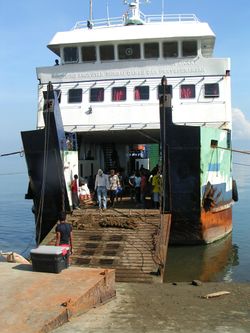Click here to register!
Difference between revisions of "The Role of Trade in Marketing Rural Products"
***** (***** | *****) |
***** (***** | *****) |
||
| Line 4: | Line 4: | ||
Trade has an important role to play in <span lang="en-GB">marketing rural products beyond regional and national borders.</span><span lang="en-GB">The sales markets for rural products vary considerably according to the country and product. T</span>ransportation and being connected to the road network is a very important <span lang="en-GB">location factor</span>. The following article explains.... | Trade has an important role to play in <span lang="en-GB">marketing rural products beyond regional and national borders.</span><span lang="en-GB">The sales markets for rural products vary considerably according to the country and product. T</span>ransportation and being connected to the road network is a very important <span lang="en-GB">location factor</span>. The following article explains.... | ||
| − | = <span lang="en-GB">The role of trade in marketing rural products beyond regional and national borders </span> = | + | |
| + | = <span lang="en-GB">The role of trade in marketing rural products beyond regional and national borders</span> = | ||
<span lang="en-GB">The sales markets for rural products vary considerably according to the country and product. In most of the Least Developed Countries (LDCs), trade beyond regional or national borders is relatively unimportant. In many emerging economies, on the other hand, and especially in Asia, the rural economy is very much oriented towards international markets. This applies both to agricultural products such as rice and fruits and to non-agricultural products of the rural non-farm economy (RNFE), such as textiles. Trade relations are usually characterised by two specific features. Firstly, export, or marketing outside the producer’s region, is rarely carried out by the producers themselves; it usually involves intermediaries or – in the case of suppliers and contract farming – the parent company. Secondly, goods are usually transported via hubs situated near cities.</span> | <span lang="en-GB">The sales markets for rural products vary considerably according to the country and product. In most of the Least Developed Countries (LDCs), trade beyond regional or national borders is relatively unimportant. In many emerging economies, on the other hand, and especially in Asia, the rural economy is very much oriented towards international markets. This applies both to agricultural products such as rice and fruits and to non-agricultural products of the rural non-farm economy (RNFE), such as textiles. Trade relations are usually characterised by two specific features. Firstly, export, or marketing outside the producer’s region, is rarely carried out by the producers themselves; it usually involves intermediaries or – in the case of suppliers and contract farming – the parent company. Secondly, goods are usually transported via hubs situated near cities.</span> | ||
| + | |||
| + | {| cellspacing="1" cellpadding="5" border="0" align="center" style="width: 500px" | ||
| + | |- | ||
| + | | [[File:Hub ferry.jpg|border|center|250px]] | ||
| + | |- | ||
| + | | | ||
| + | <span lang="en-GB">Ports and sea routes are vital to trade: a ferry in East Timor.<ref>Photo: Manfred Breithaupt, 2005.</ref></span> | ||
| + | |||
| + | |} | ||
| + | |||
= Trade and Transport: More than just Infrastructure = | = Trade and Transport: More than just Infrastructure = | ||
Revision as of 09:56, 16 September 2013
Overview
Trade has an important role to play in marketing rural products beyond regional and national borders.The sales markets for rural products vary considerably according to the country and product. Transportation and being connected to the road network is a very important location factor. The following article explains....
The role of trade in marketing rural products beyond regional and national borders
The sales markets for rural products vary considerably according to the country and product. In most of the Least Developed Countries (LDCs), trade beyond regional or national borders is relatively unimportant. In many emerging economies, on the other hand, and especially in Asia, the rural economy is very much oriented towards international markets. This applies both to agricultural products such as rice and fruits and to non-agricultural products of the rural non-farm economy (RNFE), such as textiles. Trade relations are usually characterised by two specific features. Firstly, export, or marketing outside the producer’s region, is rarely carried out by the producers themselves; it usually involves intermediaries or – in the case of suppliers and contract farming – the parent company. Secondly, goods are usually transported via hubs situated near cities.
|
Ports and sea routes are vital to trade: a ferry in East Timor.[1] |
Trade and Transport: More than just Infrastructure
Monocultures, land grabbing, emissions: The downsides of export-oriented development of the rural economy
Further Information
References
- ↑ Photo: Manfred Breithaupt, 2005.




















